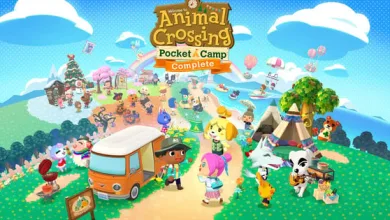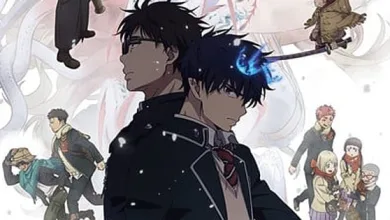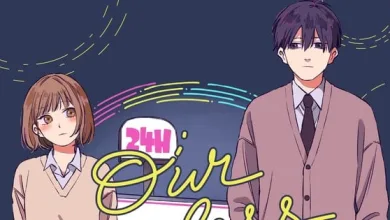ATRI: My Dear Moments Anime Series Review – Review

Anime based on visual novels must often take drastic measures to cram their frequently verbose, lengthy stories into digestible animated form. Sometimes, this works spectacularly well (Steins;Gate), conversely it can lead to disaster (Umineko, Tsukihime). ATRI is based on a relatively recent visual novel, with an average completion time of around 12-15 hours, so unlike certain titans of the medium, it isn’t so stupendously long that it needs brutal editing to cut it down to size.
The bulk of ATRI‘s story is set over a 45-day period, which is the time limit Atri herself is given to fulfill her mysterious role. For the vast majority of its runtime, ATRI is content to trundle along unconcerned by such things as time limits, instead focusing on low-stakes slice-of-life shenanigans and somewhat unconvincing romance. This isn’t like Mahoromatic with its sobering lifetime countdown at the end of every episode. It’s only after episode 10’s tense confrontation with the closest character ATRI has to an antagonist (which in itself feels like it could have been the conclusion) that it remembers there’s an overarching plot that it had better get on with resolving.
I’m quite used to visual novel stories taking a looooooong time to get started. When one expects to spend fifty or more hours reading the latest Science Adventure or Ryukishi07 opus, a lengthy preamble is forgivable – or even expected. A comparatively short, thirteen-episode anime series doesn’t have that luxury, and ATRI‘s split nature means we get the worst of both worlds. Is this a kooky slice-of-life romantic comedy? Yes, but there are enough dark elements to spoil the chilled vibes (Natsuki’s traumatic amputation, Atri’s possible manipulation of Natsuki’s feelings, and the creepy dude with the electric-shock hand). Is this an interesting piece of speculative fiction about the nature of human-AI relationships that also explores a Future Boy Conan-esque post-apocalyptic setting? Yes, but the world is frustratingly undeveloped, the plot progression hinges on coincidence and contrivance, plus the story’s resolution is horribly rushed and unsatisfying. Because ATRI can’t decide what sort of story it wants to be, it fails to excel at anything it attempts, ultimately becoming a lukewarm mishmash of genres.
That’s not to say ATRI isn’t an entertaining or compelling show – its characters are well-drawn and empathetic, and I never felt that watching it was a chore, though I frequently found myself questioning the author’s storytelling choices. While the slice-of-life parts are chilled and humorous, their sheer volume squeezes out any hope of rewarding plot progression and resolution. Atri herself may be a divisive character for many – she’s squeaky and high-pitched, child-sized, and childish in demeanor despite her self-declared advanced nature. She’s a little too similar to The Day I Became a God‘s precocious female lead, Hina Sato. Natsuki rightly finds her annoying, though he treats her like a little sister – or at least he does at the start.
What irks me most about ATRI is the seemingly forced romantic aspect between the two lead characters. Somehow, Natsuki progresses from socially acceptable fraternal care of Atri to regarding her romantically. Now, bear in mind that Atri looks and acts like a 10-year-old girl. Natsuki even brushes her teeth for her! (Though not in a Nisemonogatari way…) To be fair, Natsuki at first resists his… attractions… but when rekindling childhood memories of a girl who turns out to have been Atri, it ignites romantic feelings for her that Atri is frankly not equipped to deal with. This is yet another example of a child-like anime character “actually being adult-aged,” but Atri’s mentality is practically infantile, which makes this so much worse… Despite my misgivings about the central relationship, it does lead to a fantastic cliffhanger where Natsuki discovers the contents of Atri’s diary and very understandably feels a gut-wrenching sense of betrayal at what he discovers.
Perhaps it’s a failing of this adaptation, but I never once bought into Natsuki’s feelings for Atri, as they seemingly boiled down to the influence of previously suppressed childhood memories. Natsuki is a damaged character, losing both his parents and his leg as a child, plus suffering emotional abuse from his distant and demanding grandmother. That Atri volunteers to be “his leg,” to both metaphorically and physically support him, is a desperately sweet recurrent narrative motif. Still, the frankly off-putting romance isn’t necessary to underscore their bond. I will be forever grateful that their romantic relationship never progresses beyond a simple, chaste kiss (despite Atri’s documented research on potential sexual activities).
Viewers looking for an emotionally satisfying, intelligent, and nuanced exploration of the relationships between humans and sentient machines won’t find anything of the sort in ATRI, and that surface-level superficiality extends to the other sci-fi elements. Why is the world flooded? Who knows? Why did the previously antagonistic Catherine suddenly stop being untrustworthy and settle down to become a teacher again? Because the plot demanded she do so! How did Natsuki’s grandmother manage to build an enormous, secret, floating island mega-complex seemingly without anyone else’s help? Next question!
If I’m being overly negative about ATRI, it’s because it disappointed me, especially the rushed cop-out of an ending. I love speculative fiction, especially stories about AI. ATRI brings nothing new to the genre, barely exploring its own world while squandering an intriguing premise. At least it always looks extremely pretty, the bright, sunny color palette evoking the feeling of a never-ending summer. The flooded underground town is atmospheric, and the remnants of decaying infrastructure left on the shrinking island the characters call home hint at a wider world falling to ruin in a way left frustratingly vague.
Opener “Ano Hikari” is both evocative and upbeat, a beautiful song that perfectly fits ATRI‘s summery vibe, accompanied by stunning visuals (I love Atri’s dance with the moon ball – it perfectly captures her playful, energetic nature). The ending theme, “Yes to No no Aida ni,” is a little too hyperactive for my tastes. The simplified character designs for the ending sequence give the impression this is a kid’s show – which it most definitely is not, especially as it references the Yes/No “sex pillows” Atri buys for Natsuki’s bed. Awkward…
While I don’t regret watching ATRI, as I unironically looked forward to each new episode to see if the plot might eventually go somewhere, I can’t give it a wholehearted recommendation. Atri herself is pretty annoying, and the romance angle is uncomfortable, while the story is undeveloped and slow. I’m sad to admit it, but I doubt ATRI will leave much of a lasting impression on me. I really wanted it to.
Source link
#ATRI #Dear #Moments #Anime #Series #Review #Review



